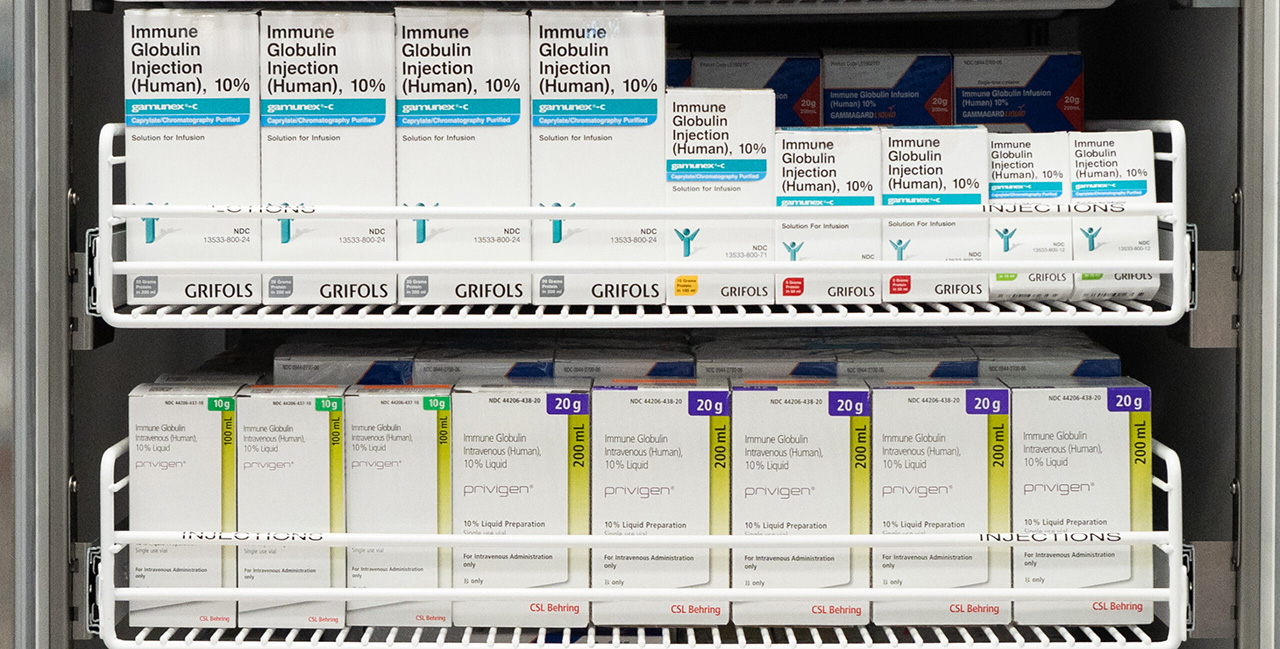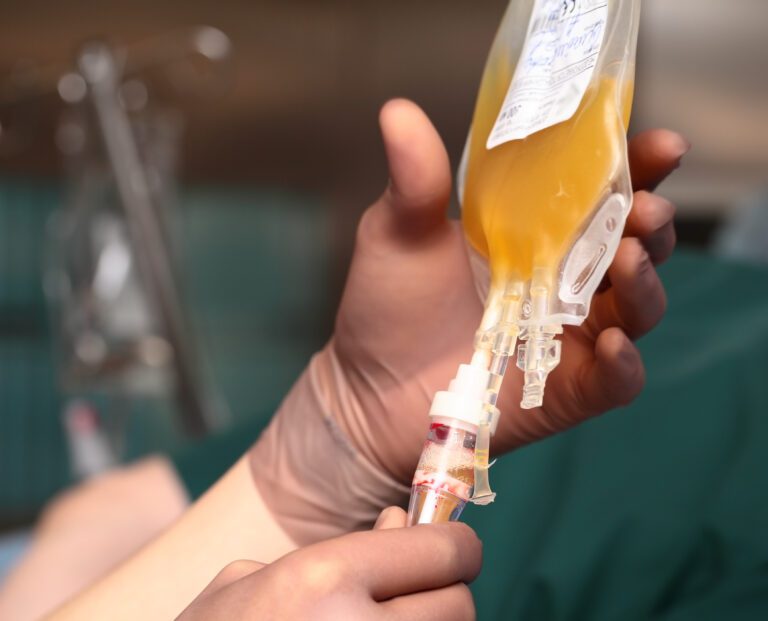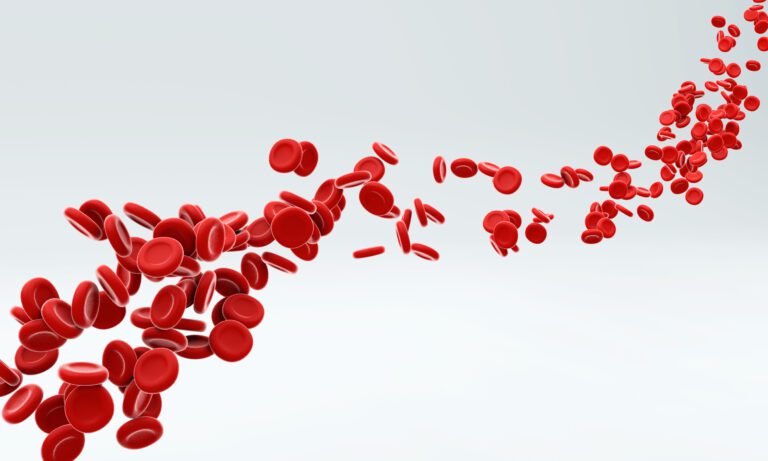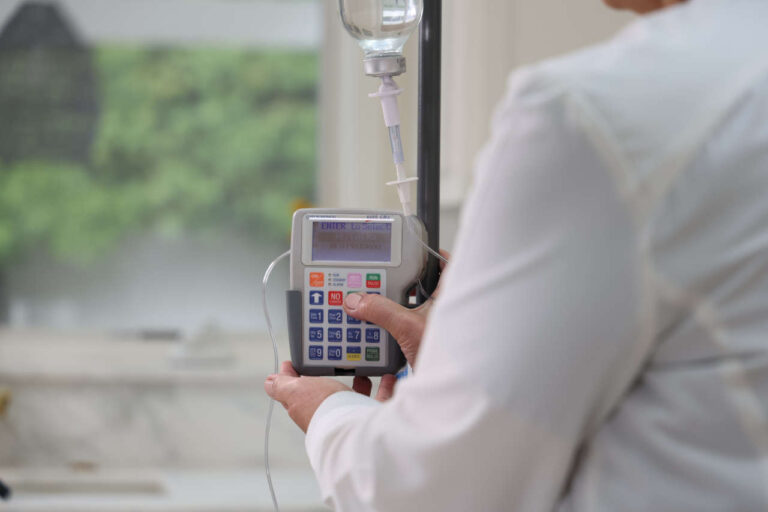
免疫球蛋白(或免疫球蛋白)是由浆细胞产生的特定蛋白质。免疫球蛋白的主要功能是增强人体免疫系统,抵抗感染。患有某些免疫系统疾病(例如自身免疫性疾病或抗体和免疫缺陷)的人需要接受免疫球蛋白输注。免疫球蛋白输注是通过从数千名健康捐献者身上采集血浆(血液中的液体部分)制成的。
有五个 免疫球蛋白的类型:
- 免疫球蛋白G
- 免疫球蛋白A
- 免疫球蛋白M
- 免疫球蛋白E
- 免疫球蛋白D
免疫球蛋白输注主要由IgG免疫球蛋白组成。输注可以通过静脉进行(称为 静脉免疫球蛋白输注)或皮下(称为 SCIG输注).
获得 IVIG 共同支付援助
与专家交谈IVIG 可以治疗什么?

免疫缺陷
免疫球蛋白 (Ig) 输注可用于治疗身体无法自然产生足够抗体的疾病,例如原发性免疫缺陷 (PI)。
自身免疫性疾病
自身免疫性疾病是指人体免疫系统错误地攻击其他健康细胞和组织。免疫球蛋白输注可以保护身体组织免受进一步损害。
工作原理
IVIG 输注有助于治疗涉及免疫缺陷和自身免疫的疾病 以下方式:
- 确切的作用机制尚不清楚,但人们认为免疫球蛋白输注疗法可以中和身体在自身免疫条件下产生的自身抗体。
- 在炎症和自身免疫性疾病中,免疫球蛋白输注可抑制B细胞和T细胞的活性。如果没有B细胞和T细胞的激活,就不会产生自身抗体,从而避免组织损伤和炎症。
IVIG 治疗的疾病
IVIG输注 可用于 以下条件:

神经系统疾病(涉及神经和大脑的疾病)
| 格林-巴利综合征(GBS) | 一种自身免疫性疾病,会破坏神经,导致四肢无力、瘫痪、刺痛、麻木和疼痛。无力症状可能始于腿部,并蔓延至手臂、躯干和面部。 |
| 多灶性运动神经病(MMN) | 一种缓慢进展的自身免疫性疾病,影响身体的多条神经,导致四肢肌肉无力。 |
| 重症肌无力(MG) | 一种导致骨骼肌无力的神经自身免疫性疾病,最常首先出现在面部和颈部。 |
| 慢性炎症性脱髓鞘性多发性神经病(CIDP) | 一种罕见的自身免疫性疾病,会导致神经损伤,从而导致手臂和腿部无力、疼痛、麻木和灼热感。 |
| 皮肌炎和炎症性肌病 | 罕见疾病会导致皮疹和肌肉无力。 |
| 多发性硬化症(MS) | 人体的免疫系统攻击神经细胞,导致麻木、疲劳和瘫痪。 |
| 兰伯特-伊顿综合征 | 与 MG 类似,Lambert-Eaton 综合征是一种导致肌肉无力的自身免疫综合征。 |
| 神经病变 | 由于手臂和脚部神经受损而导致疼痛、麻木和无力的疾病。 |
| 自身免疫性脑炎 | 一种影响大脑的严重疾病,可能导致幻觉、癫痫和异常动作。 |
获得 IVIG 事先授权

皮肤病(皮肤病)
| 川崎综合征 | 一种主要影响儿童的自身免疫性疾病,会导致血管和心脏发炎。症状包括高烧和皮肤脱皮。 |
| 中毒性表皮坏死症 | 一种罕见的、危及生命的皮肤反应,导致大面积皮肤脱皮、起泡和疼痛。 |
| 其他皮肤病 | 例子包括硬皮病、特应性皮炎和其他水疱性疾病。 |
血液病(血液相关疾病)

| 免疫性血小板减少症 | 由于自身免疫性破坏而导致血小板(帮助血液凝块形成的细胞)减少的一种疾病,从而容易出现瘀伤和出血。 |
| 血液系统癌症 | 例如骨髓瘤和慢性淋巴细胞白血病。 |
| 骨髓移植 | 骨髓移植后使用 IVIG 疗法来防止移植排斥。 |
| 其他血液病 | 示例包括 自身免疫性溶血性贫血、免疫性中性粒细胞减少症和骨髓发育不全(骨髓不产生血细胞)。 |
免疫学状况
| 原发性抗体缺陷症(PAD) | 外周动脉疾病 (PAD) 是由遗传性疾病导致的抗体生成减少所致。这些疾病包括 无丙种球蛋白血症 (XLA)和 低丙种球蛋白血症 (心血管疾病危险因素)。 |
| 继发性抗体缺乏症 | 由于疾病、感染或药物导致身体产生的抗体被破坏而引起的一种疾病。 |
其他条件
| 肾脏相关(肾脏病学)
关节相关(风湿病学) 与眼睛相关 (眼科) 传染病 | 例如血管炎症(系统性血管炎)、系统性红斑狼疮(多个身体器官的自身免疫性炎症)、葡萄膜炎(眼部炎症)以及肝炎、破伤风等传染病。 |
IVIG 效果如何?

IVIG 输注是治疗神经系统疾病的有效方法。 随机对照试验(RCT) 已经证明 静脉免疫球蛋白输注 对短期(急性)和长期(慢性)病症均有效,例如 CIDP、MG、炎症性肌病、GBS 和多灶性运动神经病。
一个 全面审查 美国过敏、哮喘和免疫学学会得出的结论是,IVIG 疗法对治疗原发性免疫缺陷疾病(如低丙种球蛋白血症)和以缺乏 B 细胞为特征的疾病非常有益。
此外,大规模研究发现IVIG疗法对特发性血小板减少性紫癜(ITP)、皮肌炎、类风湿性关节炎、炎性肌炎等均有效。
IVIG 需要多长时间才能起效?
初次治疗后,可能需要几天到几周的时间才能体验到 任何改善 症状。您也可能需要几个月的时间才能开始看到症状更明显的改善。
这里 AmeriPharma,我们专注于管理 静脉注射免疫球蛋白(IVIG)输注. 在您接受 IVIG 治疗期间和治疗后,您的处方医生和药剂师团队将对您进行严密监控。
请记住,每个人对药物的反应都不同。我们的药剂师会定期监测您的治疗进度,并与您沟通,以解决您在治疗过程中可能遇到的任何疑问。
IVIG 副作用
静脉免疫球蛋白输注 副作用 很常见,并且可能在 IVIG 治疗期间的某个时间点发生。
IVIG 副作用可分为:
- 直接不良事件
- 延迟不良事件
直接不良事件
如果 IVIG 治疗的副作用在输液期间或输液后不久出现,则被视为立即出现。
最常见的直接副作用包括:
- 流感样症状和头痛:流感样症状包括疲劳、发烧和发冷。这些是一些最常见的副作用。您的医疗保健提供者可能会在输液前不久给您其他药物(例如对乙酰氨基酚[泰诺]、抗组胺药或类固醇),以帮助预防这些副作用。
- 皮肤反应:可能会出现轻微皮疹。
- 高血压和心律失常:可能会出现高血压和心律不齐。如果您在治疗期间脱水或输液过快,则出现这些副作用的风险更高。医护人员会对您进行监测,并在必要时立即停止输液。
延迟副作用
延迟性IVIG副作用可能在IVIG治疗后数月或数年出现。接受IVIG治疗的患者中,出现此类副作用的人数不足1%。 长期副作用 包括:
- 血栓事件:血栓可能形成于腿部(深静脉血栓形成)、肺部(肺栓塞)、心脏(心脏病发作)或脑部(中风),情况可能严重甚至危及生命。风险还取决于您的其他疾病状况以及静脉注射免疫球蛋白(IVIG)的输注速度。
- 神经系统(大脑和神经系统)疾病: 例如脑膜炎(脑组织炎症)、癫痫和神经损伤。
- 肾脏损害: 这可能是由于肾脏无法清除 IVIG 蛋白。
向 IVIG 专家咨询副作用
最常见的副作用
轻微副作用 |
该怎么办 |
| 头痛、恶心、轻微皮疹、高血压、腹痛、腹泻、流感样症状 |
|
中度副作用 |
该怎么办 |
| 严重头痛、身体肿胀、恶心/呕吐、皮疹、腹泻持续超过24小时 | 除上述情况外,请立即寻求医疗帮助,因为这些副作用是意料之外的。 |
严重的副作用 |
该怎么办 |
| 发烧、过敏反应、严重腹痛、血压非常高、心律不齐、胸痛、呼吸困难 | 寻求紧急医疗救助。 |
在 AmeriPharma® 专业护理,我们的药剂师会确保在您接受 IVIG 治疗期间和治疗后对您进行密切监控,以确保您不会出现任何副作用。
如果您在静脉注射免疫球蛋白(IVIG)治疗后出现任何副作用,您可以随时联系我们的专家,我们24/7全天候为您提供帮助。我们的团队随时准备为您提供帮助。
IVIG剂量:如何确定IVIG剂量

IVIG剂量 取决于所治疗的疾病和您的体重。剂量总结如下。但请记住,剂量可能会因您使用的IVIG品牌而异。常见的品牌包括 Gammagard, Gamunex-C, 和 Privigen等等。
健康)状况 |
IVIG剂量 |
| 原发性免疫缺陷 | 初始剂量为0.3~0.6 g/kg/月,之后根据反应增加剂量 |
| 免疫性血小板减少性紫癜(ITP) | 1g/kg/天,连续2天(如果24小时内血小板反应充分,可以停止第二次给药) 或者 400 mg/kg,每日一次,连续5天 |
| CIDP | 负荷剂量:2g/kg(连续2至4天分次服用);维持剂量:每3周1天,每次1g/kg |
| GBS(非说明书用途) | 2g/kg,2-5天给药 |
| 炎性肌炎(未列入说明书用途) | 2g/kg,分次给药,连续2至5天 |
| 重症肌无力(未列入说明书用途) | 2g/kg,连续2至5天分次给药 |
| 多灶性运动神经病 | 0.5至2.4克/千克/月 根据回应 |
如果 IVIG 不起作用会发生什么?
可能需要输注几次才能看到效果 静脉注射免疫球蛋白(IVIG)治疗然而,有些人可能无法获得预期的效果。如果出现这种情况,您的医疗保健提供者可能会考虑调整疗法,使用其他生物药物,或增加 IVIG 输注疗法的剂量或频率。
进一步阅读: 当 IVIG 无效时该怎么办
在 AmeriPharma® 专业护理我们密切关注患者对 IVIG 治疗的反应。我们的专业药剂师团队随时准备评估您的治疗进展,如果未达到预期,我们将与您讨论其他治疗方案。
获取您的 IVIG 剂量 – 在家输液
总费用是多少?
IVIG 输注费用取决于多种因素,例如诊断、年龄、体重、注射方法(静脉注射还是皮下注射)、所需剂量次数和治疗时间。
所以, IVIG费用 每个人的情况可能有很大差异。 每克成本 也因处方品牌的不同而有很大差异, 每克含量范围从 $100 到 $350例如,GBS 的治疗费用为 $20,000,而对于其他适应症,费用可能超过 $30,000。
AmeriPharma® 专科护理让您在家中舒适地接受免疫球蛋白输注治疗,这有助于降低在医院或输液中心接受输注的相关费用。如果您有兴趣在家中接受 IVIG 治疗, 咨询专家 在 AmeriPharma® 专业护理中进一步讨论我们如何帮助您管理治疗,同时协助支付高额的自付费用。
IVIG 治疗是否在保险范围内?
IVIG 通常由保险承保,但承保范围可能会有所不同,具体取决于某些因素,例如:
- 医疗状况:保险通常为被诊断患有原发性免疫缺陷和其他经批准的疾病(如神经系统疾病、血液病、皮肤病、眼科疾病和传染病)的患者的 IVIG 提供保险。
- 医疗必需品:医疗保健提供者认为 IVIG 对于患者的治疗至关重要,并提供文件。
- 保险计划政策:有些保险计划可能也涵盖静脉注射免疫球蛋白(IVIG)的居家输注。这取决于保险公司的指导方针和患者的病情。
有关更多保险详情(例如自付费用),请务必咨询您的保险公司。
Medicare 涵盖 IVIG 吗?
是的,Medicare 在许多情况下涵盖 IVIG。具体承保范围取决于:
- 诊断
- 治疗环境
- 给药途径
有关 Medicare 和 IVIG 的深入讨论,请阅读我们的文章: Medicare IVIG 覆盖基本指南.
自2024年1月1日起,Medicare法案永久涵盖原发性免疫缺陷病 (PIDD) 患者在家中注射免疫球蛋白 (IVIG) 的费用。该费用包含药物、耗材和必要护理服务的捆绑支付。
共同支付援助
IVIG 治疗费用昂贵,您可能正在寻找经济援助。获取援助的方法之一是查看您是否有资格获得共付额援助。
据神经病学行动基金会称,IVIG患者援助金可根据患者的具体情况申请经济援助。 IVIG 财务援助 选项包括:
- 选项 1:您可以致电执行静脉注射免疫球蛋白 (IVIG) 给药方案的医疗服务提供者,了解所用 IVIG 的名称。了解名称后,您可以致电制造商,了解您是否有资格获得经济援助。
- 选项 2:如果您在家中进行 IVIG 输液,并且符合获得帮助的条件,可以联系药房提供商。AmeriPharma® 提供家庭输液服务。 安排咨询 检查您是否也有资格获得共付额援助。
- 选项 3:最后,各种非营利组织和其他项目可以提供 IVIG 财务援助。AmeriPharma® Specialty Care 使用专有软件,将患者与最符合其需求的基金会进行匹配,并指导患者完成整个申请流程。 联系我们 开始吧。
如果您有兴趣了解有关 IVIG 不同方面的更多信息,请访问我们的 IVIG 患者资源中心.













